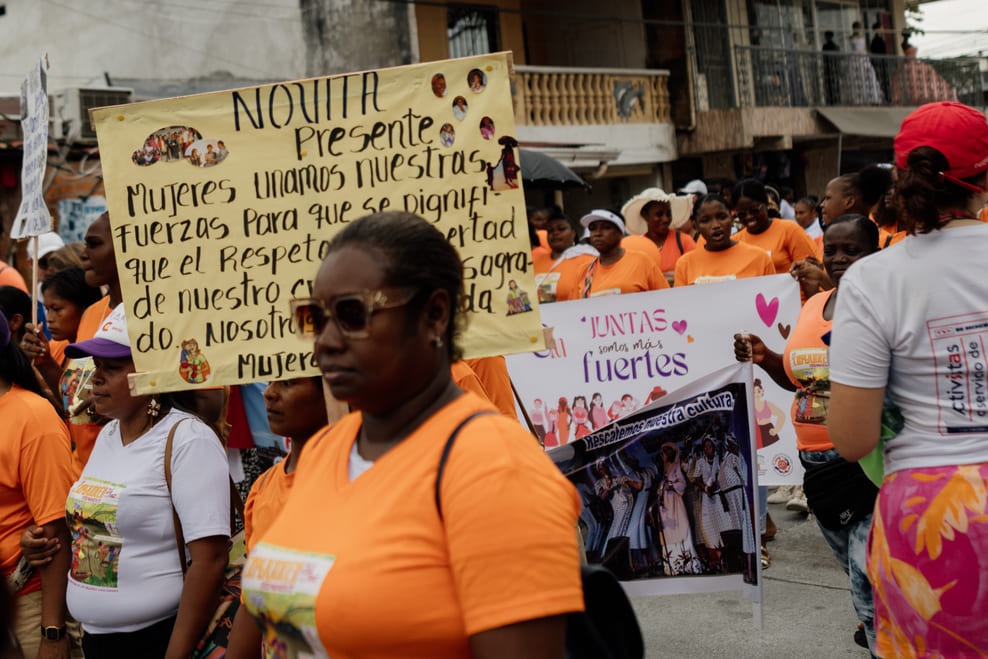Women on the move: feminist mobilisations for peace in Colombia
Written in conversation with Shima Pardo, Programme Coordinator, La Ruta Pacífica de las Mujeres.
In Latin America, feminist movements continue to play a crucial role in the fight for peace and social justice. In this series of articles, we explore emblematic cases of feminist mobilisations in the region, highlighting their achievements and challenges. In this article, we focus on our coalition member, Ruta Pacífica in Colombia, an example of how organisation and solidarity can transform realities marked by violence and inequality. Next, we analyze the experience of the Asociación Generando Equidad, Liderazgo y Oportunidades (ASOGEN) in Guatemala, another story of struggle and hope.
Ruta Pacífica: a path of resistance and transformation in Colombia
On March 8th, International Women’s Day, Istmina, a municipality in the heart of Chocó, witnessed a powerful mobilisation of unity and resistance. Afro-descendant, indigenous, and mestizo women gathered for a mobilisation organized by Ruta Pacífica, a network of more than 300 women’s collectives dedicated to peace and justice in Colombia.
This year’s mobilisation had a special significance due to the current context. Since the signing of the peace agreements in 2016 between the Colombian government and the FARC, violence was expected to decrease. However, in regions like Chocó, armed conflicts continue to affect communities. This department, rich in biodiversity and with a strategic location, has long been a battleground for illegal armed groups such as FARC dissidents, the Clan del Golfo, and the ELN. These groups impose their control through extortions, massacres, and forced displacements, with women and children being the most vulnerable victims.
Moreover, this mobilisation is framed within the Action Plan for the United Nations Security Council Resolution 1325, which emphasizes the importance of women’s participation in building peace and security. Resolution 1325, adopted in 2000, calls on member states to ensure women’s representation at all decision-making levels in peace and security processes. Ruta Pacífica seeks to amplify women’s voices and protect and promote their rights throughout the country.
The strength of a network: organization and coordination of a ‘Comadreo’
Ruta Pacífica is a feminist movement composed of a vast network with representatives across the country, facilitating the organization and coordination of the mobilisation. This year, they decided to organize “A Permanent Comadreo for Peace.” More than just a simple mobilisation, the “comadreo” aimed to make women’s demands visible and draw attention to the ongoing violence they face in Chocó.
All mobilisations convened by Ruta Pacífica require a minimum preparation period of one year, and the mobilisation to Istmina was no exception. Dialogues were established with local institutions in Istmina and the Chocó department, informing them that a group of 1,800 women would meet in this territory, requiring visibility and protection from the entire community and regional institutions.
Given the long distances to travel to Chocó, women from the Putumayo department – in southern Colombia – began their journey on March 5. Women from the Cauca department joined on March 6th, and they continued toward Chocó. Women from Valle del Cauca (western Colombia) and Eje Cafetero (northeast Colombia) joined in, entering from the southeastern zone of the department. On March 7th, they arrived in Quibdó, the departmental capital, where a first political and symbolic stop was made, and all the women who would participate in the mobilisation from Quibdó gathered.
Each regional coordinator of Ruta Pacífica was responsible for a group of women, preparing them to understand the purpose of the mobilisation: “to highlight the grave human rights situation in the department and the need for peace from the voice and sentiment of women.”
Marching toward hope: challenges and resilience
More than 1,200 women arrived in Istmina on the night of March 7th, preparing for the significant event on March 8th. Over 600 women from 15 municipalities in Chocó mobilised from 5 a.m. on March 8th. In total, more than 1,800 women advanced in the permanent comadreo.
As they moved forward, their steps echoed with the demands for peace and justice. The path was not easy; each kilometre travelled was laden with bitter memories of violence and displacement.

Safety was a constant concern, as Chocó remains a dangerous territory due to the presence of illegal armed groups. The women marched together, moving in large, organised groups to protect each other.
Throughout the journey, the local community showed their support from windows and doors, offering words of encouragement and improvised refreshments. The participants, united in their diversity, sang songs of hope and solidarity, demonstrating that their struggle was not only against violence but also for dignity and recognition of their rights.
Beyond the results: the power of advocacy
Although the mobilisation did not seek immediate and tangible results, it served as a powerful advocacy tool. The women called for the guarantee of life, freedom, and integrity for all women and children. They demanded an end to the murders of young people and a deep respect for women’s rights as decision-makers. According to UN Women statistics, more than 2 million women and girls in Colombia are exposed to high risks of gender-based violence, disproportionately impacting Indigenous and Afro-descendant communities in the Pacific region. This underscores the urgency of their inclusion in peace processes.
The March 8 event was a reminder of the power of solidarity and women’s resilience in their fight for a better future. Through these actions, Ruta Pacífica continues its mission to transform the reality of women in Colombia, demonstrating that hope and determination are stronger than any armed conflict.
Nasaret Pulido C., a resident of the capital and an activist with Ruta Pacífica for six years, was one of the participants who traveled from Bogotá with nine other women, spending 24 hours on each journey. She commented that, although the long distance and extended time on the bus to Istmina were exhausting, it was well worth it because it was one of the most impactful experiences of her life. The mere fact of meeting so many women from different parts of the country, seeing their symbolic representations from their respective territories, and witnessing their resilience, joy, and determination despite the violence they endure was priceless. Being part of a unified voice to declare that women, when united, are strong, powerful, and unstoppable in demanding their right to live free, happy, and without any form of violence. She added that being in the Chocoan territory was the most beautiful experience, for the beauty of its people, the joy of the women and girls, their happy eyes despite any internal sadness. A thousand times over, Nasaret would participate in a Ruta Pacífica mobilisation to shout that “Peace is Unstoppable” for everyone.
Ruta Pacífica’s mobilisation in Colombia demonstrates the strength and resilience of women in their struggle for peace and social justice. Through solidarity and organization, these women have created a powerful movement that continues to challenge violence and oppression. This story of hope and determination is only part of the collective effort. In another piece, we explore the work of ASOGEN, another coalition member, in their fight against gender-based violence in Guatemala.



